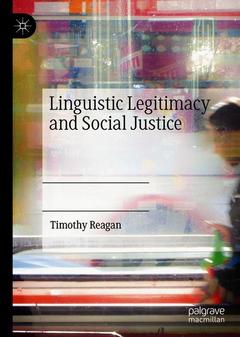Description
Linguistic Legitimacy and Social Justice, 1st ed. 2019
Author: Reagan Timothy
Language: English
Subjects for Linguistic Legitimacy and Social Justice:
Keywords
language ideology; language legitimacy; language and power; language extinction; language endangerment; constructed languages; foreign language education; African American English; American Sign Language; African American Vernacular English (AAVE); Deaf studies; Esperanto; indigenous languages; multicultural education; Spanglish; Yiddish; multilingualism; lingua franca; Volapük; Afrikaans
94,94 €
Disponible chez l'éditeur (délai d'approvisionnement : 15 jours).
Add to cart434 p. · 14.8x21 cm · Relié
Résumé
/li>Sommaire
/li>Biographie
/li>Commentaire
/li>




